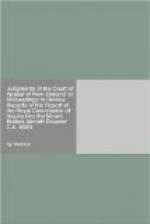We must begin by removing any possible misconception about the scope of these proceedings. They are not proceedings in which this Court can adjudicate on the causes of the disaster. The question of causation is obviously a difficult one, as shown by the fact that the Commissioner and the Chief Inspector of Air Accidents in his report came to different conclusions on it. But it is not this Court’s concern now. This is not an appeal. Parties to hearings by Commissions of Inquiry have no rights of appeal against the reports. The reason is partly that the reports are, in a sense, inevitably inconclusive. Findings made by Commissioners are in the end only expressions of opinion. They would not even be admissible in evidence in legal proceedings as to the cause of a disaster. In themselves they do not alter the legal rights of the persons to whom they refer. Nevertheless they may greatly influence public and Government opinion and have a devastating effect on personal reputations; and in our judgment these are the major reasons why in appropriate proceedings the Courts must be ready if necessary, in relation to Commissions of Inquiry just as to other public bodies and officials, to ensure that they keep within the limits of their lawful powers and comply with any applicable rules of natural justice.
Although this is not an appeal on causation or on any other aspect of the Commission’s report, the issues with which this Court is properly concerned—the extent of the Commissioner’s powers in this inquiry, and natural justice—cannot be considered without reference to the issues and evidence at the inquiry. We are very conscious that we have not had the advantage of seeing and hearing the witnesses. It can be very real, as all lawyers know. It is true that the kind of analytical argument we heard from counsel, with concentration focused on the passages of major importance in the report and the transcript of evidence, can bring matters into better perspective than long immersion in the details of a case. Necessarily this Court is more detached from the whole matter than was the Commissioner. And several different judicial minds may combine to produce a more balanced view than one can. But as against those advantages, which we have had, there is the advantage of months of direct exposure to the oral evidence, which he had. So we have to be very cautious in forming opinions on fact where there is any room for different interpretations of the evidence.
Having stressed those limitations on the role of this Court, we think it best to state immediately in general terms the conclusions that we have reached in this case. Then we will go on to explain the background, the issues and our reasoning in more detail. Our general conclusion is that the paragraph in the report (377) in which the Commissioner purported to find that there had been ‘a pre-determined plan of deception’ and ’an orchestrated litany of lies’ was outside his jurisdiction and contained findings made contrary of natural justice. For these reasons we hold that there is substance in the complaints made by the airline and the individuals. Because of those two basic defects, an injustice has been done, and to an extent that is obviously serious. It follows that the Court must quash the penal order for costs made by the Commissioner against Air New Zealand reflecting the same thinking as paragraph 377.




